World
Russia Says U.S Withdrawal From Afghanistan Would Worsen Situation
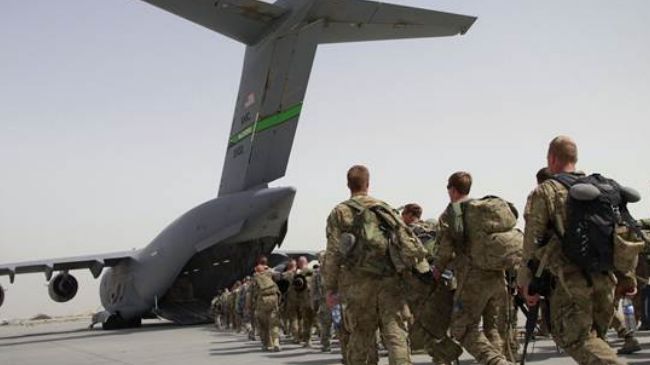
 Russia’s foreign ministry said on Tuesday that any decision by the United States to withdraw its forces from Afghanistan would worsen the situation in the country, Interfax news agency reported.
Russia’s foreign ministry said on Tuesday that any decision by the United States to withdraw its forces from Afghanistan would worsen the situation in the country, Interfax news agency reported.
The ministry said it had not spoken to the new administration of U.S. President Donald Trump about the issue.
“As far as I know, Trump does not currently have any intentions to withdraw, which is logical, because if in the current environment he decides to withdraw the contingent, then everything will collapse,” Interfax quoted Zamir Kabulov, special representative to the Russian president on Afghanistan, as saying.

World
Zelenskiy says he is willing to quit presidency if it means peace in Ukraine
The Ukrainian president also said he wanted to see Trump as a partner for Ukraine and more than a simply a mediator between Kyiv and Moscow.
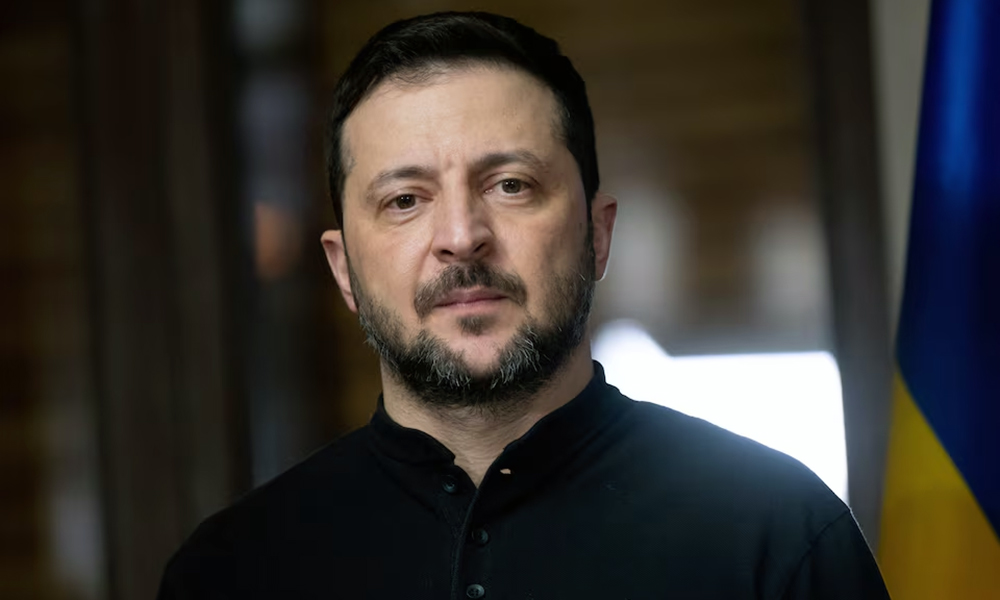
Ukraine’s President Volodymyr Zelenskiy said on Sunday he was willing to give up his position if it meant peace in Ukraine, adding that he could exchange his departure for his country’s entry into the NATO military alliance, Reuters reported.
“If (it means) peace for Ukraine, if you really need me to leave my post, I am ready,” an irritated-looking Zelenskiy said when asked during a press conference whether he was ready to leave his post if it meant securing peace.
“I can exchange this for NATO (membership), if that condition is there, immediately,” the president added.
U.S. President Donald Trump has pushed for elections to take place in Ukraine, having branded Zelenskiy a “dictator”, an apparent reference to the Ukrainian leader’s official five-year term running out in 2024. Russia has cited this in the past to assert that he is an illegitimate leader, read the report.
Ukrainian legislation prohibits holding elections during a state of martial law, which Ukraine declared the day Russia invaded in February 2022. Trump also falsely claimed that Zelenskiy has an approval rating of four percent.
“I am not going to be in power for decades, but we will not allow Putin to be in power over the territories of Ukraine either,” Zelenskiy said on Sunday, referring to Russian President Vladimir Putin.
A poll released this week put Zelenskiy’s approval ratings at 63%, and he made reference to this when talking about Trump’s claims on Sunday, calling his false statements “dangerous”.
“I believe it’s not a mistake, it’s misinformation that has an impact,” Zelenskiy said.
Zelenskiy said earlier this week Trump was in a “disinformation bubble”, angering the U.S. President and his team. On Sunday, he sought to justify the earlier comments.”(The information) about four percent of Ukrainians supporting me is one of the signals spread by the Russians, that’s why I said it was a disinformation attack, I didn’t say it was President Trump,” Zelenskiy said on Sunday.
Trump’s criticism of Zelenskiy came as relations between the two leaders deteriorated sharply in recent weeks.
Zelenskiy opposes the idea of elections in a full-scale war, a position backed by his major domestic political opponents.
The Ukrainian president also said he wanted to see Trump as a partner for Ukraine and more than a simply a mediator between Kyiv and Moscow.
“I really want it to be more than just mediation… that’s not enough,” he told a press conference in Kyiv.
Trump has said Ukraine should give the U.S. $500 billion in critical raw materials as payback for aid which Kyiv has already received from the previous Joe Biden administration.
Zelenskiy declined to sign a detailed U.S. proposal last week that would have seen Washington receiving 50% of Ukraine’s critical minerals, which include graphite, uranium, titanium and lithium, the latter a key component in electric car batteries, Reuters reported.
He has said he wants to do a deal, but that it should offer security guarantees for Ukraine in return.
On Friday, he said U.S. and Ukrainian teams were working on a deal and Trump said he expects a deal will be signed soon.
On Sunday, Zelenskiy said at the press conference that he rejected the idea that Ukraine owed the U.S. $500 billion.
“There cannot be (any) format which makes us debtors for the old (aid given).”
Zelenskiy said earlier this week that Washington had supplied his country with $67 billion in weapons and $31.5 billion in direct budget support throughout the nearly three-year war with Russia.
“I will not sign what 10 generations of Ukrainians will be repaying,” Zelenskiy said of the minerals deal.
Ukraine’s economy minister Yuliia Svyrydenko said on Sunday the 18% of Ukraine under Russian occupation contained about $350 billion of critical raw materials, adding that Ukraine is conducting additional geological research to update decades-old information, read the report.
The president’s chief of staff, Andriy Yermak, said on Sunday that he had held constructive new talks with senior U.S. officials on a deal to develop Ukrainian minerals.
“We are moving forward with our work. This was a constructive discussion,” Yermak wrote on Telegram.
World
In reversal, Trump says Russia attacked Ukraine

President Donald Trump reversed course on Friday and said Russia did in fact invade Ukraine, and that Kyiv would soon sign a minerals agreement with the United States as part of efforts to end the Ukraine war.
Trump had said on Tuesday that Ukraine “should have never started” the war three years ago, prompting a wave of criticism both domestically and internationally. Pressed on the subject in an interview with Fox News Radio on Friday, he acknowledged Russia had invaded Ukraine on the order of Russian President Vladimir Putin, Reuters reported.
“Russia attacked, but they shouldn’t have let him attack,” Trump said, adding that Ukraine President Volodymyr Zelenskiy and then-U.S. President Joe Biden should have taken steps to avert the invasion.
Later, Trump predicted a minerals agreement would be reached soon.
“We’re signing an agreement, hopefully in the next fairly short period of time,” Trump told reporters in the Oval Office when asked about a possible deal for Ukraine’s minerals.
Zelenskiy said separately on Friday that Ukrainian and U.S. teams were working on a draft agreement. “I am hoping for … a fair result,” he said in a video address after sharp exchanges this week between the two leaders.
Trump denounced Zelenskiy as a “dictator” on Wednesday and warned he had to move quickly to secure peace with Russia, which invaded Ukraine nearly three years ago, or risk losing his country.
The change in tone from the United States, Ukraine’s most important backer, has alarmed European officials and stoked fears that Kyiv could be forced into a peace deal that favors Putin.
Zelenskiy had said Trump was trapped in a “disinformation bubble”, but later toned down his statements and said he was hoping for American pragmatism.
Zelenskiy on Wednesday rejected U.S. demands for $500 billion in mineral wealth from Ukraine to repay Washington for wartime aid, saying the United States had supplied nowhere near that sum so far and offered no specific security guarantees in the agreement.
Ukraine has valuable deposits of strategic minerals that the U.S. wants. These include uranium, lithium, cobalt, rare earths and more and are used in applications such as batteries, technology and aerospace.
‘THEY DON’T HAVE ANY CARDS’
Speaking at a White House event earlier on Friday, Trump was critical of Zelenskiy while refraining from negative comments about Putin.
“I’ve had very good talks with Putin, and I’ve had not such good talks with Ukraine,” Trump said. “They don’t have any cards, but they’re playing tough.”
Separately, the United States on Friday proposed a United Nations resolution to mark the third anniversary of Russia’s invasion of Ukraine. The three-paragraph U.S. draft, seen by Reuters, mourns loss of life during the “Russia-Ukraine conflict” and “implores a swift end to the conflict.”
Kyiv and its European allies want their own text to be adopted by the UN General Assembly on Monday calling for de-escalation, an early cessation of hostilities and peaceful resolution to the conflict.
The German government said on Friday that Chancellor Olaf Scholz and Zelenskiy agreed in a phone call that Ukraine must have a seat at the table in peace talks.
Polish President Andrzej Duda, meanwhile, urged Zelenskiy to keep up calm and constructive cooperation with Trump.
Duda, whose term in office expires this year, was one of Trump’s preferred international partners during his 2017-2021 presidency and they have described themselves as friends.
Poland’s president is due to meet Trump in Washington on Saturday, Poland’s state news agency PAP reported.
World
Trump tells ‘dictator’ Zelenskiy to move fast or lose Ukraine
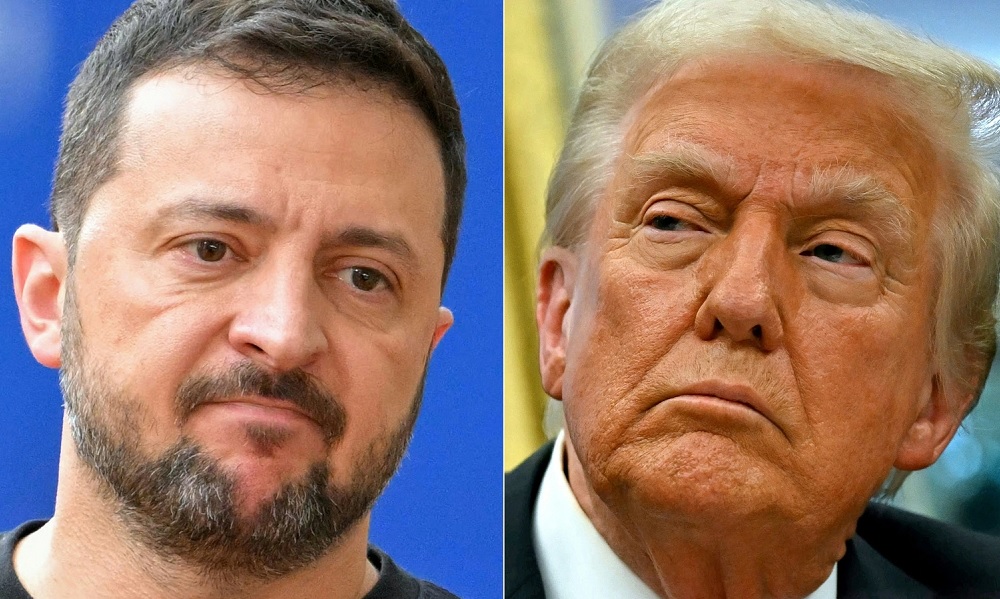
U.S. President Donald Trump denounced Ukrainian President Volodymyr Zelenskiy as a “dictator” on Wednesday and warned he had to move quickly to secure peace or risk losing his country, deepening a feud between the two leaders that has alarmed European officials.
The extraordinary attacks – a day after Trump claimed Ukraine was to blame for Russia’s 2022 invasion – heightened concerns among U.S. allies in Europe that Trump’s approach to ending the Russia-Ukraine conflict could benefit Moscow, Reuters reported.
Less than a month into his presidency, Trump has upended U.S. policy on the war, ending a campaign to isolate Russia with a Trump-Putin phone call and talks between senior U.S. and Russian officials that have sidelined Ukraine.
“A Dictator without Elections, Zelenskyy better move fast or he is not going to have a Country left,” Trump wrote on social media, using an alternate spelling for the Ukrainian president’s name.
In response, Ukrainian Foreign Minister Andrii Sybiha said no one could force his country to give in.
“We will defend our right to exist,” Sybiha said on X.
Later in the day while speaking to investors and executives in Miami, Trump doubled down on his comments, again calling Zelenskiy a “dictator” and suggesting the Ukrainian president wanted to prolong the war to “keep the gravy train going,” a reference to U.S. military aid.
Zelenskiy’s five-year term was supposed to end in 2024, but elections cannot be held under martial law, which Ukraine imposed in February 2022 in response to Russia’s invasion.
Trump’s outburst followed Zelenskiy’s comments on Tuesday that the U.S. president was parroting Russian disinformation when he asserted that Ukraine “should never have started” the war, which began with Russia’s full-scale invasion three years ago.
U.S. Vice President JD Vance on Wednesday warned Zelenskiy against “badmouthing” Trump.
“Everyone who knows the president will tell you that is an atrocious way to deal with this administration,” Vance said in his West Wing office, the Daily Mail reported.
Russia has seized some 20% of Ukraine and is slowly but steadily gaining territory in the east. Moscow said its “special military operation” responded to an existential threat posed by Kyiv’s pursuit of NATO membership. Ukraine and the West call Russia’s action an imperialist land grab.
The Ukrainian leader said Trump’s assertion that his approval rating was just 4% was Russian disinformation and that any attempt to replace him would fail.
“We have evidence that these figures are being discussed between America and Russia. That is, President Trump … unfortunately lives in this disinformation space,” Zelenskiy told Ukrainian TV.
The latest poll from the Kyiv International Institute of Sociology, from early February, found 57% of Ukrainians trust Zelenskiy.
Following Trump’s latest remarks, U.N. spokesperson Stephane Dujarric said Zelenskiy “sits in office after duly-held elections.” When asked who started the war, Dujarric responded that Russia had invaded Ukraine.
German Chancellor Olaf Scholz said it was “false and dangerous” for Trump to call Zelenskiy a dictator, German newspaper Spiegel reported.
U.S. security ally Australia, which has provided A$1.5 billion in support to Ukraine in its war with Russia, rejected Trump’s assertions about Ukraine.
Australia’s Defence Minister Richard Marles said “the war in Ukraine must be resolved on Ukraine’s terms, because the aggressor here is Russia”. The country’s opposition leader Peter Dutton said bluntly: “I think President Trump has got it wrong”.
“Australia should stand strong and proud with the people of Ukraine. It’s a democracy, and this is a fight for civilisation. Vladimir Putin is a murderous dictator, and we shouldn’t be giving him an inch,” said Dutton.
A few of Trump’s fellow Republicans in Congress said they disagreed that Zelenskiy was a dictator and that Ukraine bore responsibility for Russia’s invasion. But they stopped short of criticizing Trump directly, with Senate Majority Leader John Thune – a longtime supporter of Ukraine – saying Trump needed “space” to work on a peace deal.
EUROPE LEFT SCRAMBLING
Zelenskiy has suggested giving U.S. companies the right to extract valuable minerals in Ukraine in return for U.S. security guarantees.
He rejected a U.S. proposal last week that would have seen Washington receiving 50% of Ukraine’s critical minerals, including lithium, a key component in electric car batteries. Zelenskiy told reporters on Wednesday that the deal was too focused on U.S. interests, saying “I can’t sell our country.”
Speaking to reporters aboard Air Force One on Wednesday, Trump claimed that Ukraine had “more or less” agreed to the proposal and complained that U.S. Treasury Secretary Scott Bessent was treated “rather rudely” while visiting Kyiv. He said he would seek to resurrect the minerals deal.
European officials have been left shocked and flat-footed by the Trump administration’s Ukraine moves in recent days.
At a second meeting of European leaders in Paris, hastily arranged by French President Emmanuel Macron earlier in the day, there were more calls for immediate action to support Ukraine and bolster Europe’s defense capabilities, but few concrete decisions.
Macron and British Prime Minister Keir Starmer will visit Washington next week, according to White House national security adviser Mike Waltz.
Following Trump’s latest attacks, Zelenskiy discussed approaches to a peace settlement with NATO Secretary General Mark Rutte, Macron and Starmer, including the importance of security guarantees.
Starmer expressed support for Zelenskiy as Ukraine’s democratically elected leader, Starmer’s office said on Wednesday.
Keith Kellogg, the U.S. Ukraine envoy, traveled to Kyiv on Wednesday to meet with Zelenskiy and said as he arrived that he understood “the need for security guarantees,” adding that part of his mission would be “to sit and listen.”
The 27-member European Union on Wednesday agreed on a 16th package of sanctions against Russia, including on aluminium and vessels believed to be carrying sanctioned Russian oil.
Trump said he may meet Putin this month. In Moscow, Putin said that Ukraine would not be barred from peace negotiations, but success would depend on raising the level of trust between Moscow and Washington.
Putin, speaking a day after Russia and the U.S. met in Riyadh to hold their first talks on how to end the conflict, also said it would take time to set up a summit with Trump, which both men have said they want.
Ukraine and European governments were not invited to Tuesday’s talks in the Saudi capital, which magnified their concern that Russia and the U.S. might cut a deal that ignores their vital security interests.
Ukraine was counting on “the unity of Europe and the pragmatism of America,” Zelenskiy said in a video address on Wednesday.
Trump says Europe must step up to guarantee any ceasefire deal.
-
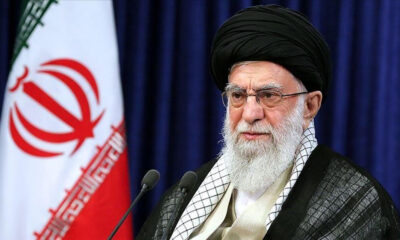
 Latest News4 days ago
Latest News4 days agoIran’s supreme leader emphasizes need to expand relations with Afghanistan
-
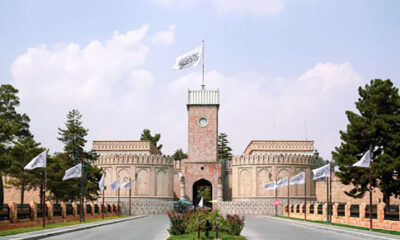
 Latest News4 days ago
Latest News4 days agoAfghanistan’s membership at ICC no longer valid: IEA
-
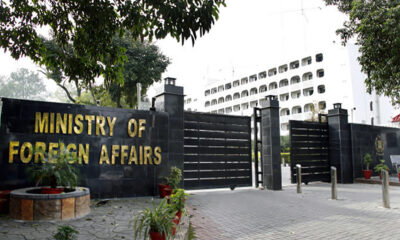
 Latest News5 days ago
Latest News5 days agoPakistan rejects IEA’s claims of mistreatment of migrants
-
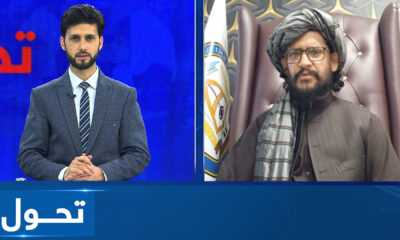
 Tahawol5 days ago
Tahawol5 days agoTahawol: Nangarhar’s security status reviewed
-

 Latest News4 days ago
Latest News4 days agoJapan tells visiting IEA delegation to respect human rights
-

 Latest News3 days ago
Latest News3 days agoPakistan wants Afghans without visas to leave Islamabad and Rawalpindi by February 28
-

 World4 days ago
World4 days agoTrump tells ‘dictator’ Zelenskiy to move fast or lose Ukraine
-

 Sport3 days ago
Sport3 days agoBavuma wary of Afghanistan challenge in Champions Trophy















